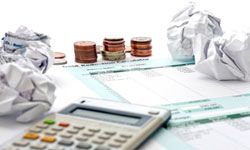Building a financial future -- whether it's your retirement, your family's future needs or simply attaining your personal goals and getting the things you want -- all starts with saving. Saving is the best and most important way to make sure you're financially safe when it counts. And it's easy to learn how.
Saving doesn't just mean getting discounts on your purchases. It also means putting away money for a rainy day and pretending you never saw it; creating an emergency fund so that if something does go wrong, you won't be sick with worry; wiping out debt once and for all; paying off those bills that never seem to go away; and, eventually, it means putting your money to work for you.
Advertisement
By finding ways to lower your everyday costs, you'll build habits that can change the way you look at your life, your household and the future. But it starts with some basic principles and some potentially terrifying concepts: Budget! Savings account! Spending habits!
Those are just a few words guaranteed to scare you to death or fill you with guilt. But if you can step back and look at your patterns of behavior, your dreams for the future and the real impact of your choices every day, you'll be surprised how painless -- and fun -- saving money can be.





